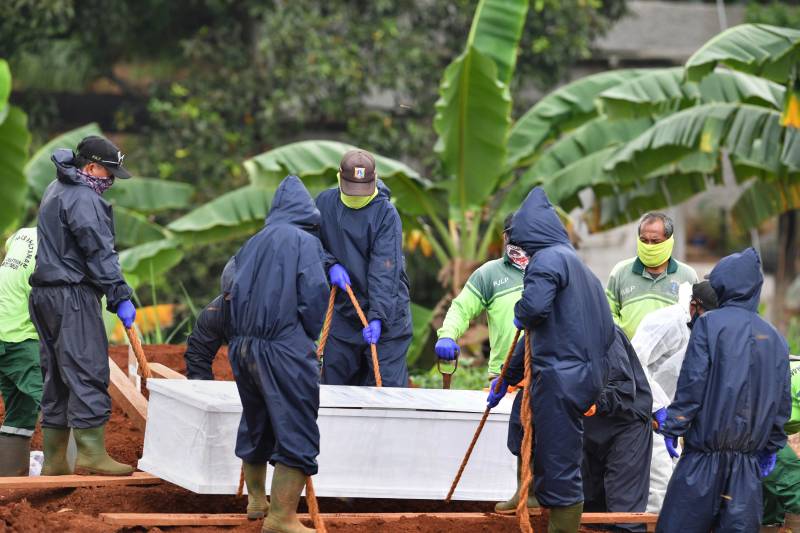Indonesia's gravediggers battle coronavirus fears, stigma

Stay tuned with 24 News HD Android App

Gravedigger Junaidi Hakim shouts "hurry up" as he summons his weary colleagues in a never-ending race to bury novel coronavirus victims at a Jakarta cemetery.
The team switches quickly from digging fresh graves to burying the bodies -- aiming to get the task done in under 10 minutes to lessen the chance of getting infected themselves.
"The most worrying part is when we're unloading a coffin because we have to touch it," said 42-year-old Hakim, a father of four. "We feel a bit relieved after it's buried."
Some 50 gravediggers at Pondok Ranggon cemetery -- one of two earmarked for COVID-19 victims in the Indonesian capital -- are working up to 15 hours a day, seven days a week, for monthly wages of 4.2 million rupiah ($290).
They dig at least 20 fresh graves daily, marked with white wooden poles that list the name, birthdate and day the occupant died.
But they can hardly keep up with the influx of confirmed and suspected virus victims.
"The ambulances never stop bringing us bodies," said Hakim.
- 'Heart breaks' -
The team struggles to keep up in the searing tropical heat, with sobbing relatives never far away.
Families are urged not to linger, robbing them of the chance to perform prayers for loved ones.
"My heart breaks seeing those crying families," said Minar, 54, who like many Indonesians goes by one name.
"I've been digging graves for 33 years now and I've never been this tired before. This is probably a test from God," he added.
The challenges are compounded in the fasting month of Ramadan when many in Indonesia, the world's biggest Muslim majority nation, don't eat or drink during daylight hours.
Naman Suherman said he is able to overcome gnawing thirst and hunger in the belief he's doing something "noble" for victims whose covered burial pits are sprinkled with pink flowers.
"What strengthens my faith on this job is knowing that I can help take the deceased to their final resting place," the 55-year-old gravedigger said.
How many people the virus has claimed across the Southeast Asian archipelago of more than 260 million is unclear.
An official death toll of 1,191 as of Monday is widely believed to be well below reality, and Indonesia has one of the world's lowest testing rates.
Government officials acknowledge data are patchy and incomplete.
At least 2,107 people have been buried under COVID-19 safety protocols in epicentre Jakarta alone -- nearly double the reported national toll.
Other cities have also seen unusually high burial figures in recent months, suggesting even more victims.
Volunteer database KawalCovid-19, which was created by health and technology professionals, has estimated there have been more than 3,000 virus deaths in just 16 of the country's 34 provinces.
- 'Afraid of me' -
That would be no surprise for the gravediggers at Pondok Ranggon cemetery who have seen their workload soar.
But most didn't know the risks, at first burying virus victims without protective equipment.
"Initially, none of us knew about coronavirus," said Minar.
"We didn't know what this disease was like until I learned from the television news that it was infectious.
"The next day I rushed to buy my own facemask. Several days later we started getting personal protective equipment."
Despite those precautions, gravedigger Hakim says neighbours suddenly started keeping a wide berth since the first cases appeared in March.
"Although they don't say it out loud, I can feel they're keeping a distance," he said.
"Like they're afraid of me."
